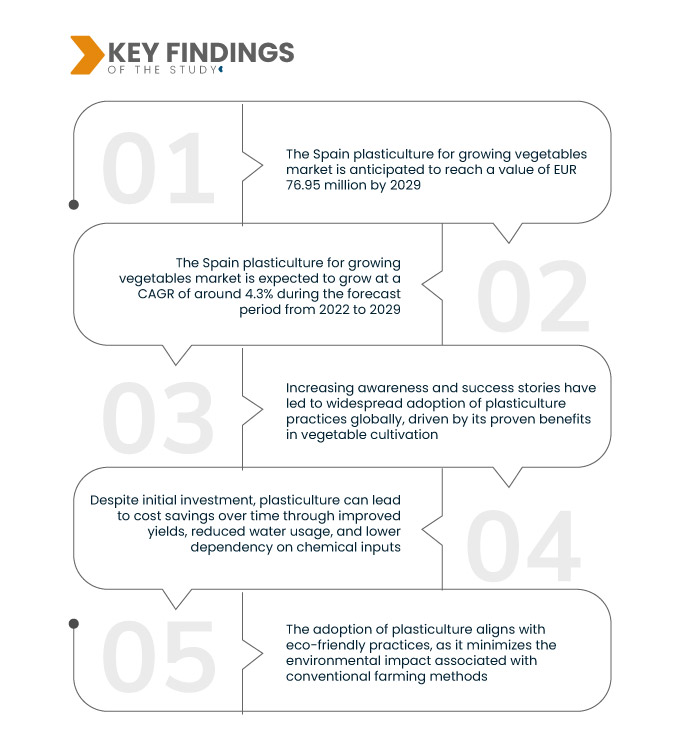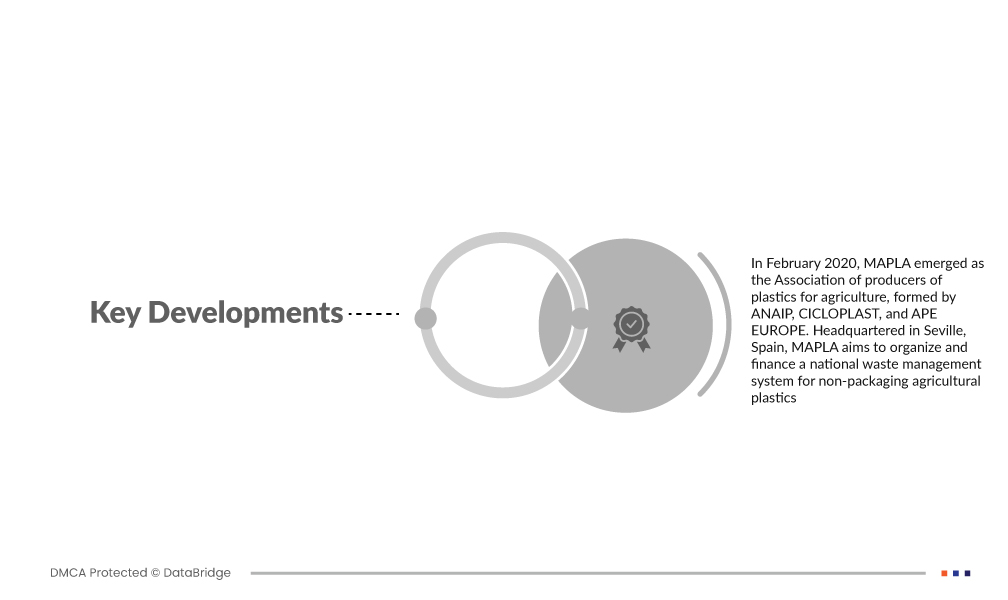Plasticulture in vegetable cultivation deploys plastic films, mulches, and covers to optimize agriculture. It enhances productivity by regulating soil temperature, conserving water, suppressing weeds, and protecting crops. Farmers widely adopt plasticulture for improved crop quality and increased yields, underscoring its pivotal role in contemporary agriculture. This practice aligns with the industry's pursuit of higher productivity, making plasticulture an essential component of modern farming practices worldwide.
Access Full Report @ https://www.databridgemarketresearch.com/reports/spain-plasticulture-for-growing-vegetables-market
Data Bridge Market Research analyses that the Spain Plasticulture for Growing Vegetables Market, which was EUR 54.94 in 2021, is expected to reach EUR 76.95 million by 2029, at a CAGR of 4.3% during the forecast period of 2022 to 2029. Plastic mulches in plasticulture effectively curb weed growth, reducing nutrient competition and fostering an optimal environment for vegetable crops. This method enhances agricultural productivity by mitigating weed-related challenges and ensuring the vitality of cultivated vegetables.
Key Findings of the Study
- The Spain plasticulture for growing vegetables market is anticipated to reach a value of EUR 76.95 million by 2029
- The Spain plasticulture for growing vegetables market is expected to grow at a CAGR of around 4.3% during the forecast period from 2022 to 2029
- Increasing awareness and success stories have led to widespread adoption of plasticulture practices globally, driven by its proven benefits in vegetable cultivation
- Despite initial investment, plasticulture can lead to cost savings over time through improved yields, reduced water usage, and lower dependency on chemical inputs
- The adoption of plasticulture aligns with eco-friendly practices, as it minimizes the environmental impact associated with conventional farming methods
Increasing key benefits of plasticulture is expected to drive the market's growth rate
Plasticulture in Spain's vegetable cultivation market is thriving due to its multifaceted advantages. Plastic films and mulch maintain soil moisture, ensuring loose, friable, and well-aerated conditions for enhanced root oxygenation. The resulting cleaner vegetables are facilitated by improved water drainage, minimizing waterlogging. These key benefits collectively contribute [JS2] to increased yields and quality, propelling the growth of Spain's plasticulture for growing vegetables market, as farmers recognize its pivotal role in fostering efficient, sustainable, and high-yield agriculture.
Report Scope and Market Segmentation
|
Report Metric
|
Details
|
|
Forecast Period
|
2022 to 2029
|
|
Base Year
|
2021
|
|
Historic Years
|
2020 (Customizable to 2014-2019)
|
|
Quantitative Units
|
Revenue in EUR Million, Volumes in Units, Pricing in USD
|
|
Segments Covered
|
Material (Polyethylene (PE), Polypropylene (PP), Poly-Vinyl Chloride (PVC), Ethylene-Vinyl Acetate Copolymer (EVA) and Others), Vegetable Type (Eggplant, Okra, Tomato, Bitter Gourd, Chili, Cabbage, Cauliflower, Broccoli and Others), Application (Nursery Management, Tunnels and Surface Cover)
|
|
Market Players Covered
|
Exxon Mobil Corporation (U.S.), Berry Global Inc. (U.S.), Groupe Barbier (France), NORTENE (France), Solplast (Spain), NaturPláS Plásticos Agrícolas S.L (Spain), Sotrafa (Spain), PLASTIKA KRITIS S.A. (Greece) among others
|
|
Data Points Covered in the Report
|
In addition to the insights on market scenarios such as market value, growth rate, segmentation, geographical coverage, and major players, the market reports curated by the Data Bridge Market Research also include in-depth expert analysis, geographically represented company-wise production and capacity, network layouts of distributors and partners, detailed and updated price trend analysis and deficit analysis of supply chain and demand.
|
Segment Analysis:
The Spain plasticulture for growing vegetables market is segmented on the basis of material, vegetable type, and application.
- On the basis of material, the Spain plasticulture for growing vegetables market is segmented into polyethylene (PE), polypropylene (PP), poly-vinyl chloride (PVC), ethylene-vinyl acetate copolymer (EVA), and others
- On the basis of vegetable type, the Spain plasticulture for growing vegetables market is segmented into eggplant, okra, tomato, bitter gourd, chili, cabbage, cauliflower, broccoli, and others
- On the basis of application, the Spain plasticulture for growing vegetables market is segmented into nursery management, tunnels, and surface cover
Major Players
Data Bridge Market Research recognizes the following companies as the major Spain plasticulture for growing vegetables market players in Spain plasticulture for growing vegetables market are Exxon Mobil Corporation (U.S.), Berry Global Inc. (U.S.), Groupe Barbier (France), NORTENE (France), Solplast (Spain), NaturPláS Plásticos Agrícolas S.L (Spain), Sotrafa (Spain), PLASTIKA KRITIS S.A. (Greece)
Market Development
- Achievement: In February 2020, MAPLA emerged as the Association of producers of plastics for agriculture, formed by ANAIP, CICLOPLAST, and APE EUROPE. Headquartered in Seville, Spain, MAPLA aims to organize and finance a national waste management system for non-packaging agricultural plastics. This cooperative effort among Spanish manufacturers and importers seeks to propel recycling initiatives within the agricultural plastic sector
For more detailed information about the Spain plasticulture for growing vegetables market report, click here – https://www.databridgemarketresearch.com/reports/spain-plasticulture-for-growing-vegetables-market












